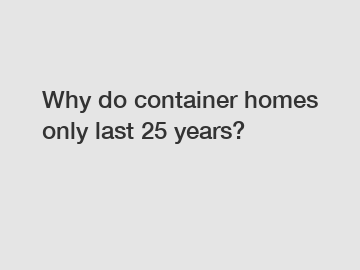Mar. 10, 2024
Construction
Container homes have gained popularity in recent years due to their affordability, sustainability, and flexibility. However, one common concern that many potential homeowners have is the lifespan of container homes. It is often believed that container homes only last around 25 years, which raises the question: Why do container homes only last 25 years?
Corrosion and Rusting.
One of the main reasons why container homes have a relatively short lifespan is due to the materials they are made from. Shipping containers are typically made from Cor-Ten steel, which is designed to withstand harsh marine environments. However, over time, this steel can still deteriorate due to exposure to moisture, salt, and other environmental factors. Corrosion and rusting are common issues that can significantly impact the structural integrity of a container home, leading to a shorter lifespan.

Furthermore, when shipping containers are stacked on top of each other during transportation, they may develop stress points and weak spots. These weak spots can worsen over time, especially when the containers are repurposed into homes and undergo additional modifications. As a result, the structural stability of the container home may be compromised, decreasing its longevity.
Lack of Insulation.
Another factor that contributes to the limited lifespan of container homes is the lack of proper insulation. Shipping containers were never designed to be lived in, so they do not provide adequate insulation for residential purposes. As a result, container homes may struggle with temperature regulation, moisture buildup, and indoor air quality issues. Without proper insulation, the interior of the container home is more susceptible to mold, mildew, and other forms of water damage, which can accelerate the deterioration of the structure.
Limited Design Flexibility.
While container homes offer a unique and modern aesthetic, their design is inherently limited by the size and shape of the shipping container. This limitation can create challenges when it comes to maximizing interior space, incorporating traditional amenities, and expanding or modifying the home in the future. As a result, container homes may not meet the changing needs of homeowners over time, leading to decreased longevity and a shorter lifespan.
Inadequate Foundation.
The foundation on which a container home is built plays a crucial role in its overall lifespan. Shipping containers are incredibly heavy and require a solid and level foundation to support them properly. However, many container homeowners opt for cost-effective or DIY foundation solutions that may not be up to par with building code standards. Without a proper foundation, container homes are more susceptible to shifting, settling, and structural damage, which can compromise their durability and longevity.
Conclusion.
In conclusion, the limited lifespan of container homes can be attributed to a combination of factors, including corrosion and rusting, lack of insulation, design limitations, and inadequate foundations. While container homes offer many benefits, it is essential for prospective homeowners to consider these potential drawbacks and take proactive measures to mitigate them. By investing in proper maintenance, regular inspections, and quality construction practices, container homeowners can prolong the lifespan of their homes and enjoy them for many years to come.
If you are interested in learning more about container homes or need assistance with building or maintaining one, please contact us for expert guidance and support.
For more Steel Structure Cattle House, expandable house, expandable container homes for saleinformation, please contact us. We will provide professional answers.
Previous: Ultimate Guide to Container Homes: Building, Cost, Design Ideas
Next: Enhanced Privacy: How MDF Board with Holes Revolutionizes Room Dividers?
If you are interested in sending in a Guest Blogger Submission,welcome to write for us!
All Comments ( 0 )